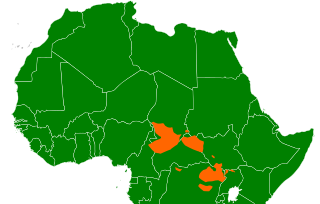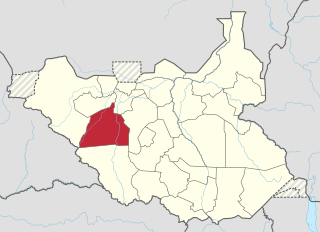Related Research Articles

Sudanese Arabic, also referred to as the Sudanese dialect, Colloquial Sudanese or locally as Common Sudanese refers to the various related varieties of Arabic spoken in Sudan as well as parts of Egypt, Eritrea, Ethiopia, and Chad. Sudanese Arabic has also influenced a number of Arabic-based pidgins and creoles, including Juba Arabic, widely used in South Sudan, as well as Ki-Nubi, spoken by the Nubi communities of Kenya and Uganda.
Jur or JUR may refer to:
The Western Nilotic languages are one of the three primary branches of the Nilotic languages, along with the Eastern Nilotic languages and Southern Nilotic languages; Themselves belonging to the Eastern Sudanic subfamily of Nilo-Saharan. The about 22 Western Nilotic languages are spoken in an area ranging from southwestern Ethiopia and South Sudan via northeastern Democratic Republic of the Congo and northern Uganda to southwestern Kenya.
The dozen Luo, Lwo or Lwoian languages are spoken by the Luo peoples in an area ranging from southern Sudan to western Ethiopia to southern Kenya, with Dholuo extending into northern Tanzania and Alur into the Democratic Republic of the Congo. They form one of the two branches of the Western Nilotic family, the other being the Dinka–Nuer. The Southern Luo varieties are mutually intelligible, and apart from ethnic identity they might be considered a single language.

Central Sudanic is a family of about sixty languages that have been included in the proposed Nilo-Saharan language family. Central Sudanic languages are spoken in the Central African Republic, Chad, South Sudan, Uganda, Congo (DRC), Nigeria and Cameroon. They include the pygmy languages Efé and Asoa.
Jur Modo is an ethnic group in Sudan numbering about 182,000. They have a rural way of life, living in relatively isolated compounds. They speak Jur Modo language, a Nilo-Saharan language, though some speakers also use Arabic, Dinka, Moru, Baka, or Zande. The principal religion is animism.
Moru is an ethnic group of South Sudan. Most of them live in Western Equatoria. They speak Moru, a Central South Sudanic language. Many members of this ethnicity are Christians, most being members of the Episcopal Church of the South Sudan (ECS). The Pioneer missionary in the area was Dr Kenneth Grant Fraser of the Church Missionary Society (CMS). The population of this ethnicity possibly does not exceed 200,000.
The Thuri, also known as Shatt, and Luo people of South Sudan. They speak DheThuri, a Luo language that is similar to the Jur and Dinka languages. Having been perceived as close to the Dinka people, the Thuri were targets of ethnic violence during the Second Sudanese Civil War, when the "Army of Peace", a mostly Fertit pro-government militia, attacked them as supporters of the mostly Dinka SPLA rebels. This caused many Thuri to take up arms and to join the SPLA in order to take revenge against other Fertit groups.
Beli may refer to:
The Bongo–Bagirmi or Sara–Bongo–Bagirmi languages are the major branch of the Central Sudanic language family with about forty languages. Principal groups include Bagirmi languages such as Naba and the Sara languages. They are spoken across CAR, Chad, South Sudan, and adjacent countries.
Anuak or Anywaa is a Luo language which belongs to the western Nilotic branch of the Nilotic language family. It is spoken primarily in the western part of Ethiopia and also in South Sudan by the Anuak people. Other names for this language include: Anyuak, Anywa, Yambo, Jambo, Yembo, Bar, Burjin, Miroy, Moojanga, Nuro. Anuak, Päri, and Jur-Luwo comprise a dialect cluster. The most thorough description of the Anuak language is Reh (1996) Anywa Language: Description and Internal Reconstructions, which also includes glossed texts.
The Bongo languages, or Bongo–Baka, comprise six languages spoken in South Sudan. They are members of the Central Sudanic language family.
Luwo, is a language spoken by the Luo people of Bahr el Ghazal region in South Sudan. The language is predominantly spoken in the western and northern parts of Bahr el Ghazal. The Luwo form a majority in the Jur River County.
The Jur Beli are an ethnic group living in South Sudan.
Jur Modo may refer to:

The culture of South Sudan encompasses the religions, languages, ethnic groups, foods, and other traditions of peoples of the modern state of South Sudan, as well as of the inhabitants of the historical regions of southern Sudan.
´Bëlï, or Jur Beli, is a Central Sudanic language spoken by the Beli and Sopi people of South Sudan. The Beli people are mainly found in South Sudan, a region southeast of Rumbek. The language is considered as endangered, and it is mostly spoken by the older generation.
The Luwo are a Nilotic ethnic group that live in the western parts of South Sudan. They are part of a larger group of ethno-linguistically related Luo peoples of East Africa. They speak the Luwo language which is a Northern Luo language.

Wau State was a state in South Sudan that existed between 2 October 2015 and 22 February 2020. It was located in the Bahr el Ghazal region, and was part of the former state of Western Bahr el Ghazal. Wau State bordered Aweil State, Gbudwe State, Gogrial State, Lol State, and Tonj State.
Bex is a municipality in Switzerland.
References
- ↑ Jur Modo at Ethnologue (25th ed., 2022)

- Persson, Andrew M. and Persson, Janet R. 1991. Mödö-English dictionary with grammar. (Bilingual Dictionaries of Sudan, 1.) 1st edn. Nairobi: Sudan: Summer Institute of Linguistics.
- Persson, Janet. 2004. Bongo-Bagirmi languages in Sudan. Occasional Papers in the Study of Sudanese Languages 9. 77-84.